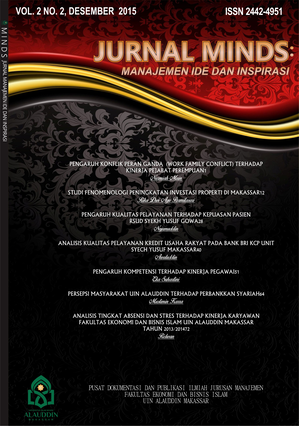Date Log
Copyright (c) 2022 Kartini Kartini, Reza Widhar Pahlevi, Nur Habiba Rachmi (Author)

This work is licensed under a Creative Commons Attribution 4.0 International License.
Mapping of Digital Financial Literacy Research: A Bibliometric Review
Corresponding Author(s) : Reza Widhar Pahlevi
Jurnal Minds: Manajemen Ide dan Inspirasi,
Vol. 9 No. 1 (2022): June
Abstract
This study aims to review digital financial literacy based on the previously-published articles. A literature study based on the Scopus database from 1984 to 2022 is conducted by employing the VOSviewer tool to analyze the collected data for the bibliometric analysis. The findings point toward the people's behavior on investment decisions. The questionnaire is the most widely used data collection method, and the conversations are evenly shared in developing and developed countries. The key themes are still divided into financial inclusion and general digital finance issues. Discussion and future research are provided.
Keywords
Download Citation
Endnote/Zotero/Mendeley (RIS)BibTeX
References
Aziz, A., & Naima, U. (2021). Rethinking digital financial inclusion: Evidence from Bangladesh. Technology in Society, 64(January), 101509. https://doi.org/10.1016/j.techsoc.2020.101509
Baniya, S., Doan, S., Kumari, A., Johnson, G. P., & Schwarz, V. M. (2021). Coalitional literacies of digital safety and solidarity: A white paper on nextGEN international listserv. Computers and Composition, 62, 102681. https://doi.org/10.1016/j.compcom.2021.102681
Blevins, B. (2018). Teaching Digital Literacy Composing Concepts: Focusing on the Layers of Augmented Reality in an Era of Changing Technology. Computers and Composition, 50, 21–38. https://doi.org/10.1016/j.compcom.2018.07.003
Chlouba, T., Šimková, M., & Němcová, Z. (2011). Application for education of financial literacy. Procedia - Social and Behavioral Sciences, 28, 370–373. https://doi.org/10.1016/j.sbspro.2011.11.070
Durán, L., Almeida, A. M., & Figueiredo-Braga, M. (2021). Digital audiovisual contents for literacy in depression: A pilot study with university students. Procedia Computer Science, 181(2020), 239–246. https://doi.org/10.1016/j.procs.2021.01.140
Feng, S., Zhang, R., & Li, G. (2022). Environmental decentralization, digital finance and green technology innovation. Structural Change and Economic Dynamics, 61, 70–83. https://doi.org/10.1016/j.strueco.2022.02.008
Frączek, B., & Urbanek, A. (2021). Financial inclusion as an important factor influencing digital payments in passenger transport: A case study of EU countries. Research in Transportation Business and Management, 41(April 2020). https://doi.org/10.1016/j.rtbm.2021.100691
Gerlach, J. M., & Lutz, J. K. T. (2021). Digital financial advice solutions – Evidence on factors affecting the future usage intention and the moderating effect of experience. Journal of Economics and Business, 117(May), 106009. https://doi.org/10.1016/j.jeconbus.2021.106009
Guthrie, C. P., & Nicholls, C. M. (2015). The Personal Budget Project: A practical introduction to financial literacy. Journal of Accounting Education, 33(2), 138–163. https://doi.org/10.1016/j.jaccedu.2015.04.002
Kass-Hanna, J., Lyons, A. C., & Liu, F. (2021). Building financial resilience through financial and digital literacy in South Asia and Sub-Saharan Africa. Emerging Markets Review, May, 100846. https://doi.org/10.1016/j.ememar.2021.100846
Koenig, A. (2020). The Algorithms Know Me and I Know Them: Using Student Journals to Uncover Algorithmic Literacy Awareness. Computers and Composition, 58, 102611. https://doi.org/10.1016/j.compcom.2020.102611
Kramer, M. M. (2016). Financial literacy, confidence and financial advice seeking. Journal of Economic Behavior and Organization, 131(March 2013), 198–217. https://doi.org/10.1016/j.jebo.2016.08.016
Li, J., Wu, Y., & Xiao, J. J. (2020). The impact of digital finance on household consumption: Evidence from China. Economic Modelling, 86(July 2019), 317–326. https://doi.org/10.1016/j.econmod.2019.09.027
Litterscheidt, R., & Streich, D. J. (2020). Financial education and digital asset management: What’s in the black box? Journal of Behavioral and Experimental Economics , 87(June), 101573. https://doi.org/10.1016/j.socec.2020.101573
Lo Prete, A. (2022). Digital and financial literacy as determinants of digital payments and personal finance. Economics Letters, 213, 110378. https://doi.org/10.1016/j.econlet.2022.110378
Luo, Y., Peng, Y., & Zeng, L. (2021). Digital financial capability and entrepreneurial performance. International Review of Economics and Finance, 76(May), 55–74. https://doi.org/10.1016/j.iref.2021.05.010
Mitrofanova, Y. S., Glukhova, L. V., Burenina, V. I., Evstafeva, O. A., & Popova, T. N. (2021). Smart production: Features of assessing the level of personnel digital readiness. Procedia Computer Science, 192, 2962–2970. https://doi.org/10.1016/j.procs.2021.09.068
Ozili, P. K. (2018). Impact of digital finance on financial inclusion and stability. Borsa Istanbul Review, 18(4), 329–340. https://doi.org/10.1016/j.bir.2017.12.003
Reilly, C. A. (2021). Reading risk: Preparing students to develop critical digital literacies and advocate for privacy in digital spaces. Computers and Composition, 61, 102652. https://doi.org/10.1016/j.compcom.2021.102652
Resmi, S., Pahlevi, R. W., & Sayekti, F. (2019). The effect of financial and taxation literacy on sustainable competitive advantage through business growth: A study of creative msmes in special region of Yogyakarta, Indonesia. International Journal of Entrepreneurship, 23(4), 1–9.
Sconti, A. (2022). Digital vs. in-person financial education: What works best for Generation Z? Journal of Economic Behavior and Organization, 194, 300–318. https://doi.org/10.1016/j.jebo.2021.12.001
Selimović, J., Pilav-Velić, A., & Krndžija, L. (2021). Digital workplace transformation in the financial service sector: Investigating the relationship between employees’ expectations and intentions. Technology in Society, 66(February). https://doi.org/10.1016/j.techsoc.2021.101640
Shen, Y., Hu, W., & Hueng, C. J. (2021). Digital Financial Inclusion and Economic Growth: A Cross-country Study. Procedia Computer Science, 187, 218–223. https://doi.org/10.1016/j.procs.2021.04.054
Supardianto, Ferdiana, R., & Sulistyo, S. (2019). The role of information technology usage on startup financial management and taxation. Procedia Computer Science, 161, 1308–1315. https://doi.org/10.1016/j.procs.2019.11.246
Suwana, F., & Lily. (2017). Empowering Indonesian women through building digital media literacy. Kasetsart Journal of Social Sciences, 38(3), 212–217. https://doi.org/10.1016/j.kjss.2016.10.004
Usmayanti, V. (2022). Analisis Sistematis Penelitian Literasi Keuangan. Jurnal MANAGE, 1(1), 19–28. https://ejournal.unama.ac.id/index.php/jumanage/article/view/28%0Ahttps://ejournal.unama.ac.id/index.php/jumanage/article/download/28/17
Yu, T. K., Lin, M. L., & Liao, Y. K. (2017). Understanding factors influencing information communication technology adoption behavior: The moderators of information literacy and digital skills. Computers in Human Behavior, 71, 196–208. https://doi.org/10.1016/j.chb.2017.02.005
Yue, P., Korkmaz, A. G., Yin, Z., & Zhou, H. (2022). The rise of digital finance: Financial inclusion or debt trap? Finance Research Letters, December, 102604. https://doi.org/10.1016/j.frl.2021.102604
